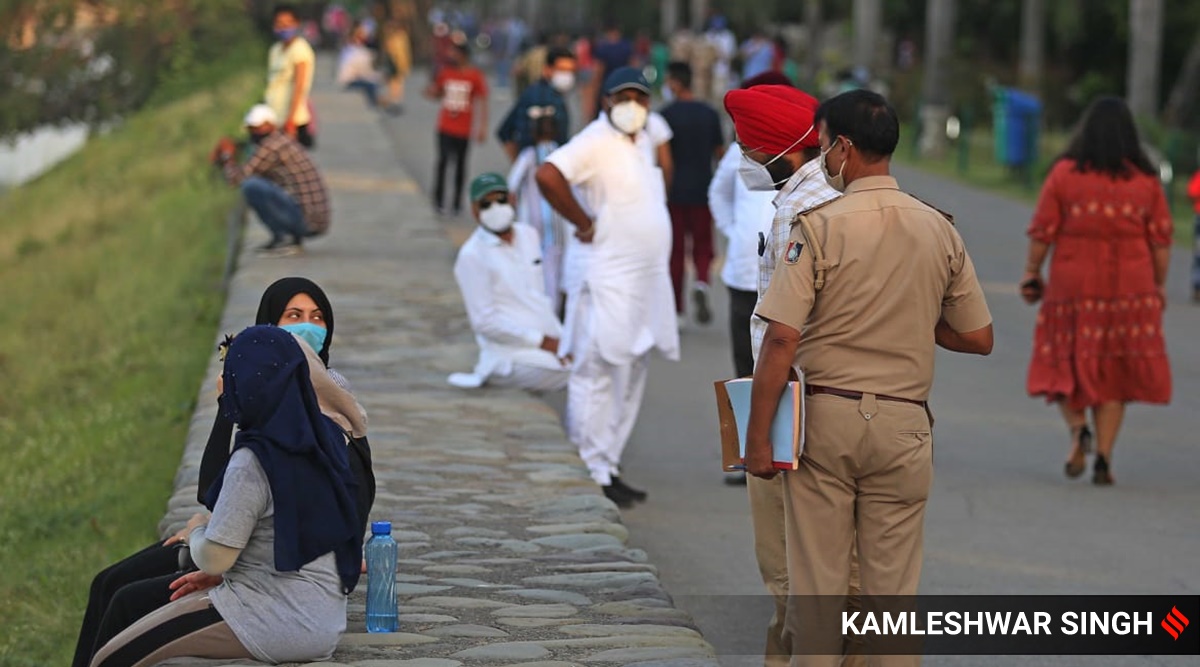 Chandigarh Police step up vigil at public places as the city opens up following a lockdown. (Express Photo: Kamleshwar Singh)
Chandigarh Police step up vigil at public places as the city opens up following a lockdown. (Express Photo: Kamleshwar Singh) The highly transmissible Delta variant of the coronavirus is present in at least 174 districts of the country — and its sub-lineage, Delta plus, has been detected in 48 samples in 10 states, the Union Health Ministry said on Friday.
The Delta variant was a major contributor to the second wave of infections that peaked in April-May, the government said. Data released by the Ministry showed that the variant was present in 52 districts across the country in March, and had spread to 174 districts by June.
ICMR chief Dr Balram Bhargava warned that even though more than 500 districts were now reporting less than 5 per cent test positivity, the second wave of the epidemic should not be assumed to have ended.
“The second wave is not yet over in the country. We have still got 75 districts that have more than 10 per cent prevalence, and we have 92 districts that have between 5 per cent and 10 per cent prevalence,” Dr Bhargava said.
“These districts are important, and it is possible for us to avert a big third wave provided individuals and the society adhere to Covid-appropriate behaviour, and avoid mass gatherings… Any indicative hotspot that we find, they need to be identified and isolated,” he said.
The Health Ministry categorised the Delta plus variant of the coronavirus as a Variant of Concern (VOC) on Tuesday, and directed states to take up immediate containment measures in clusters where it had been detected.
Dr Sujeet Kumar Singh, Director, National Centre for Disease Control (NCDC), said that of the 48 cases of Delta plus in 10 states, Maharashtra had 20, followed by Tamil Nadu (9), and Madhya Pradesh (7).
Dr Singh clarified that there was no evidence currently to suggest that the Delta plus variant was significantly more dangerous than Delta.
Its transmission potential was currently the same as that of Delta, Dr Singh said. And at this point, given the limited scientific evidence and only a small number of cases, nothing can be said on concerns over the additional mutation in Delta plus — K417N — which has been linked with immune escape mechanism and a potential reduction in monoclonal antibody response, he said.
“Since the Delta variant is already a VOC, its sub-lineage will also be called VOC. I also want to clarify that the Delta plus variant signifies Delta variant with an additional mutation — the ‘plus’ does not signify that it is more transmissible or will cause more severe disease than the Delta variant. When there is any such scientific evidence (on increased transmissibility) we will inform you,” Dr Singh said.
“There are very limited cases of Delta plus variant in India as well as across the globe; therefore, we cannot say that in any of these districts, the Delta plus variant is causing an increasing trend in cases,” he said.
Dr Bhargava announced that ICMR would, in about a week, come out with results of the effectiveness trial of vaccines against the Delta plus variant.
“Delta plus is present in 12 countries; 48 cases have been detected in India, however they have been very localised. This virus has been isolated and is being cultured. Laboratory tests to check vaccine effect are ongoing and we should have these results in seven to 10 days’ time,” he said.
Dr Singh said that as of June, 174 districts were affected by the Delta variant. “In all of these districts, we continue to monitor the trend… The proportion of cases with Variants of Concern (Delta and Delta plus) has risen from 10.31 per cent in May to 51 per cent on June 20… In some states, the Delta variant has slowly replaced the Alpha variant. This shows that the Delta variant is a stronger variant than the Alpha variant,” he said.
Variants of Concern had been detected in 21,109 sequenced samples in the country, Dr Singh said. According to official data, the prevalence of the Delta variant had gone up from only 10 per cent of samples in March to a staggering 90 per cent in May.
Eight states have reported approximately 50 per cent of the total VOCs in the country: Maharashtra (3,117), Delhi (2,973), Kerala (2,382), West Bengal (1,553), Punjab (1,431), Telangana (1,127), Haryana (945), and Andhra Pradesh (829).
- The Indian Express website has been rated GREEN for its credibility and trustworthiness by Newsguard, a global service that rates news sources for their journalistic standards.

